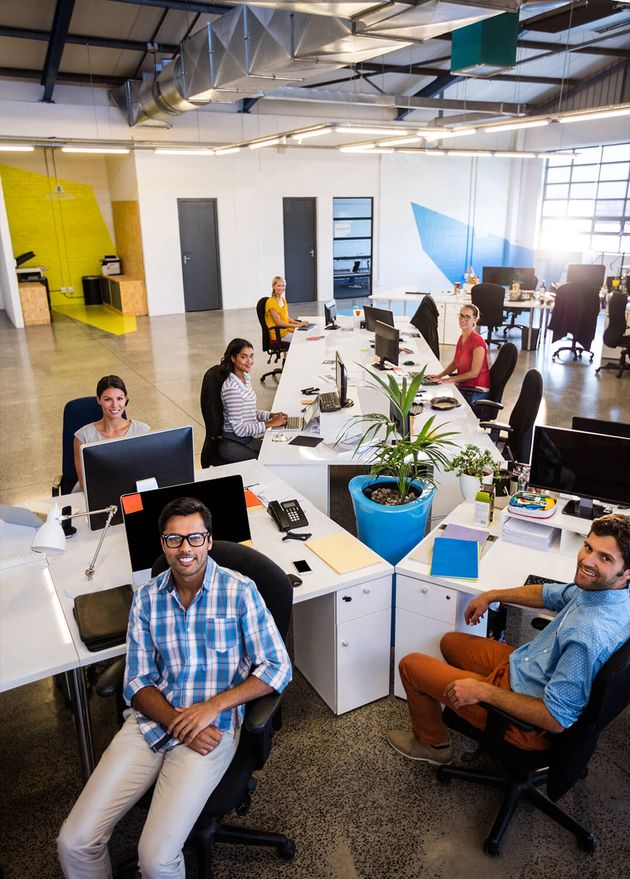The Future of Work: Exploring Co-Working Space Dynamics in Modern Business
Co-working spaces are defined by most as shared workspaces where people from various companies collaborate in a group setting. Typically, these areas provide printing capabilities, conference rooms, and Wi-Fi. Co-working spaces were first conceptualized in the middle of the 2000s. Since then, co-working spaces have become a trendy option for many workers.
Nowadays, co-working spaces have become more popular as a substitute for typical office arrangements, drawing in a growing number of workers. Individuals from various organizations may work individually or cooperatively in shared workspaces known as co-working spaces. Let's discover more about the dynamics of co-working spaces in the modern business landscape.
🏆 Business Fact!
Research by the Global Coworking Unconference Conference (GCUC) projects that by 2024, there will be over 40,000 co-working spaces globally, a sign of the increasing acceptance and appeal of this flexible working style.
Change in Work Culture After Pandemic
Although co-working spaces started in the early 2000s, the pandemic boosted them. During the pandemic, offices were closed, and most companies shifted to a work-from-home situation. Even after the pandemic, many people preferred working remotely, or the hybrid method was used. This led to an explosion of the need for co-working spaces, as these spaces gave freedom and flexibility to work.
As the trend of co-working spaces increased, startups offering these workspaces also started to boom. They started incorporating technology and advanced setups to ensure they met the requirements. This trend also helped companies that had their workers using coworking spaces as it reduced their operational costs for the management of employees.
Trends in Co-Working Spaces
The trends seen in the co-working space market are influencing its future and are predicted to continue in the years to come. These developments are changing the nature of co-working spaces and what makes them appealing to different kinds of businesses and workers.
Rise of Niche Co-Working Spaces
The expansion of co-working spaces has aided the rise of niche co-working spaces. These spaces serve specific markets, groups of people, or hobbies. Niche co-working spaces are becoming more and more popular. They provide a setting where like-minded people may work together, develop their enterprises, and work. Workers in these locations build stronger community bonds due to their similar interests and difficulties, which improves networking and collaborative experiences.
Integration of Technology in Co-Working Spaces
Co-working spaces use technology to enhance the user experience, much like most companies in the modern world. This covers virtual reality, usage data, automated booking systems, and smart building technologies. Members may easily reserve workstations, conference rooms, and other amenities.
Co-working space providers may improve their layout and resource allocation by understanding how their space is utilized. Smart building technologies like automated lighting and temperature management increase comfort and efficiency. Some co-working spaces use virtual reality to test features like virtual tours and workplace customization. This technological integration not only makes co-working spaces more user-friendly but also increases their operational efficiency.
Key Considerations for Using Co-Working Spaces
When considering using a co-working space, there are several key aspects to keep in mind:
- Work Environment
- Co-working spaces may provide a lively and energetic atmosphere but can also be loud and distracting.
- Considering whether such a setting suits your productivity requirements and work style is crucial.
- Privacy
- Privacy in collaborative workplaces might need to be revised.
- An essential part of your job involves sensitive data or private discussions.
- Getting a private office there might be worthwhile, or looking for co-working locations with conference rooms and private phone booths.
- Cost
- Coworking spaces have different costs.
- Check all your requirements and choose one that is according to your budget. It should not be too expensive for your pocket.
- Personalization
- Co-working spaces are shared, and customization is often restricted.
- Before deciding, it would be advisable to find out from the co-working space provider how much customizing is permitted if you value having a customized workplace representing your business.
- Community
- The ability to network and collaborate is one of the critical benefits of co-working environments.
- When thinking about a co-working place, observe the current membership.
- Does the same company employ them?
- Does a chance for cooperation exist?
- Does the community host networking activities regularly?
- Amenities
- Co-working spaces often include a variety of amenities, such as conference rooms and event spaces, in addition to free coffee and kitchenettes.
- Ensure that your membership includes the facilities essential to your job.
- Terms and Conditions
- Go over the terms and conditions of the co-working facility in detail.
- Recognize the guidelines for using common areas, cancelation procedures, and any extra facility fees.
Finding a co-working space that fits your work style, professional needs, and budget is essential.
🏆 Business Trivia
Did you know Brad Neuberg founded the first co-working facility in San Francisco in 2005? He blended the independence of self-employment with the sense of belonging and common goals of a conventional office setting.
Advantages of Co-Working Spaces
Co-working spaces are much more than just workplaces; they provide numerous advantages. The following are some of the main benefits that draw both people and corporations to them:
- Flexibility
- Co-working spaces have membership options adaptable to your requirements, enabling you to scale up or down.
- As a result, small and fledgling enterprises will find it simpler to control their overhead and adjust to changing conditions.
- Opportunities for Networking
- Joining a co-working space provides access to a varied professional community, resulting in plenty of networking, teamwork, and knowledge-sharing opportunities.
- Access to Resources
- Co-working spaces often include cooking facilities, conference rooms, lounges, printers, and high-speed internet.
- The amount of effort and money needed to manage these areas on your own might be significantly decreased by doing this.
- Location and Accessibility
- Many co-working spaces are located in desirable neighborhoods with quick access to cafés, public transportation, and other services.
- In addition to improving your professional experience, this will attract partners and clients.
- Decreased Operational Hassles
- You can concentrate on your job, as the co-working space provider will handle facilities management, security, and maintenance.
- Community and cooperation
- Events and activities that promote community and encourage member cooperation are often held at co-working spaces.
- Successful collaborations and a more pleasurable work environment may result from this.
- Work-Life Balance
- Co-working spaces may support a better work-life balance by allowing you to utilize the space as needed.
- For example, specific locations enable you to work around the clock. You can decide when you want to spend time with your family and when you want to work according to your own needs.
Disadvantages of Co-Working Spaces
Co-working spaces can have certain disadvantages despite their many benefits. The following are some possible drawbacks to think about:
- Noise and Distractions
- Co-working spaces may be noisy and distracting due to their high activity level. This might be a major disadvantage if you need a peaceful workplace.
- Lack of Privacy
- Privacy may be jeopardized in some shared workstations. This can be challenging if you deal with sensitive data in your work.
- Restricted Customization
- Because the workplace is shared, there is little room to make it uniquely your own.
- Cost
- Although co-working spaces provide a range of tools and facilities, they may be pricey, particularly for new and small enterprises with limited funding.
- Inconsistent Resource Availability
- Because shared amenities are shared, you may only sometimes have access to meeting rooms or printing facilities when needed.
- Transient Nature
- The same adaptability that draws people to co-working environments may also make things unstable.
- Long-term professional ties may be difficult to establish because of the rapid turnover of space users.
- Lack of Control
- You should have greater authority over the upkeep, administration, and decision-making procedures if you are a co-working space member.
- If your wants are not addressed, this might result in disagreements or unhappiness.
- Competition for Resources
- In crowded co-working spaces, there may be a rivalry for common areas like kitchens or conference rooms, which may cause disruptions and scheduling issues.
In the fast-paced workplace, co-working spaces have become a shining example of flexibility, cooperation, and creativity. They are similar to a symphony in which each member plays a distinct song, but together, they provide a beautiful melody of cooperation and development. Co-working spaces provide many alternatives for individuals wishing to start new ventures.
Freelancers seek active networking opportunities, or existing businesses want to implement a more flexible work paradigm. It's all about finding one that resonates with your rhythm. Explore the options and find a co-working space that works for you!
Recommended for you
Optimizing Aquafarming: The Interplay of Water Temperature and Dissolved Oxygen
Riley Sinclair (Digital Aqua Bear)
Phuket: The Complete Island Travel Guide
Dr. Theodore (Professor Bear)
Thailand Travel Tips: Your Ultimate Packing List and Must-Know Information
Dr. Theodore (Professor Bear)
Tattoos in Thailand: A Rich Tapestry of Art, Tradition, and Spirituality
Dr. Theodore (Professor Bear)





















